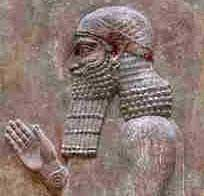Social Organizations
![]()
Politico Religious
 Social organizations within Mesopotamia society were associated mainly with politics and religion combined. The two main organizations within the cities were the temple and the palace. There actually both built upon the concept of the "household." The palace was considered the household of the king while the temple was a household of their god, and their god had to be clothed and taking care of. It was usually the slaves who actually tended to the needs of the god. The palace and the temple were highly organized and the whole Mesopotamia society contributed to its maintenance, whether it was through taxation, property, trade or war.
Social organizations within Mesopotamia society were associated mainly with politics and religion combined. The two main organizations within the cities were the temple and the palace. There actually both built upon the concept of the "household." The palace was considered the household of the king while the temple was a household of their god, and their god had to be clothed and taking care of. It was usually the slaves who actually tended to the needs of the god. The palace and the temple were highly organized and the whole Mesopotamia society contributed to its maintenance, whether it was through taxation, property, trade or war.
The palace and the temple were very similar but were also very different. The size of the palace and the way it looked depended entirely upon the ruling monarch, while the temple depended entirely upon the generous contributions of the people. After the time of Hammurapi, the temple seemed to be a bit less important than the spectacular palaces of the Neo-Assyrian empire.
It was really the royal duty and privilege of the king to make sure that the temples were cared for, and prisoners of war were required to help beautify the temples and the spoils of war were supposed to be dedicated to a great extent.
During the latter part of the Assyrian empire priests were given authority so that they could exact taxation for the king. In ancient times, the Assyrian king was also the high priest and representative of the god Ashur. This is actually one way that the Assyrian kingdom was different than the Babylonian, in that it was more theocratic.
Most of the people who lived outside the temple within the cities were, for the most part, equal in social status. Most of the people were farmers who tended land outside the cities during the day and came to sleep at night.
The city was self-governed and an assembly with a presiding officer were responsible to keep order. The wealthy, and the elderly were greatly respected. There were many merchants and craftsmen, but it was more difficult to become an exorcist or diviner, requiring that one passes a strict examination and physical fitness test. Scribes were also well-trained and organized, and one had to undergo extensive classes and rituals to become a member. Education was confined to the upper classes, mainly to the priests and scribes.
Read The Bible
- 1599 Geneva Bible (GNV)
- 21st Century King James Version (KJ21)
- American Standard Version (ASV)
- Amplified Bible (AMP)
- Amplified Bible, Classic Edition (AMPC)
- Authorized (King James) Version (AKJV)
- BRG Bible (BRG)
- Christian Standard Bible (CSB)
- Common English Bible (CEB)
- Complete Jewish Bible (CJB)
- Contemporary English Version (CEV)
- Darby Translation (DARBY)
- Disciples’ Literal New Testament (DLNT)
- Douay-Rheims 1899 American Edition (DRA)
- Easy-to-Read Version (ERV)
- English Standard Version (ESV)
- English Standard Version Anglicised (ESVUK)
- Evangelical Heritage Version (EHV)
- Expanded Bible (EXB)
- GOD’S WORD Translation (GW)
- Good News Translation (GNT)
- Holman Christian Standard Bible (HCSB)
- International Children’s Bible (ICB)
- International Standard Version (ISV)
- J.B. Phillips New Testament (PHILLIPS)
- Jubilee Bible 2000 (JUB)
- King James Version (KJV)
- Lexham English Bible (LEB)
- Living Bible (TLB)
- Modern English Version (MEV)
- Mounce Reverse Interlinear New Testament (MOUNCE)
- Names of God Bible (NOG)
- New American Bible (Revised Edition) (NABRE)
- New American Standard Bible (NASB)
- New American Standard Bible 1995 (NASB1995)
- New Catholic Bible (NCB)
- New Century Version (NCV)
- New English Translation (NET)
- New International Reader's Version (NIRV)
- New International Version - UK (NIVUK)
- New International Version (NIV)
- New King James Version (NKJV)
- New Life Version (NLV)
- New Living Translation (NLT)
- New Matthew Bible (NMB)
- New Revised Standard Version (NRSV)
- New Revised Standard Version Catholic Edition (NRSVCE)
- New Revised Standard Version, Anglicised (NRSVA)
- New Revised Standard Version, Anglicised Catholic Edition (NRSVACE)
- New Testament for Everyone (NTE)
- Orthodox Jewish Bible (OJB)
- Revised Geneva Translation (RGT)
- Revised Standard Version (RSV)
- Revised Standard Version Catholic Edition (RSVCE)
- The Message (MSG)
- The Voice (VOICE)
- Tree of Life Version (TLV)
- World English Bible (WEB)
- Worldwide English (New Testament) (WE)
- Wycliffe Bible (WYC)
- Young's Literal Translation (YLT)
Main Menu
- Ancient Assyrian Social Structure
- Ancient Babylonia
- Ancient Canaan During the Time of Joshua
- Ancient History Timeline
- Ancient Oil Lamps
- Antonia Fortress
- Archaeology of Ancient Assyria
- Assyria and Bible Prophecy
- Augustus Caesar
- Background Bible Study
- Bible
- Biblical Geography
- Fallen Empires - Archaeological Discoveries and the Bible
- First Century Jerusalem
- Glossary of Latin Words
- Herod Agrippa I
- Herod Antipas
- Herod the Great
- Herod's Temple
- High Priest's in New Testament Times
- Jewish Literature in New Testament Times
- Library collection
- Map of David's Kingdom
- Map of the Divided Kingdom - Israel and Judah
- Map of the Ministry of Jesus
- Matthew Henry Bible Commentary
- Messianic Prophecy
- Nero Caesar Emperor
- Online Bible Maps
- Paul's First Missionary Journey
- Paul's Second Missionary Journey
- Paul's Third Missionary Journey
- Pontius Pilate
- Questions About the Ancient World
- Tabernacle of Ancient Israel
- Tax Collectors in New Testament Times
- The Babylonian Captivity
- The Black Obelisk of Shalmaneser
- The Books of the New Testament
- The Court of the Gentiles
- The Court of the Women in the Temple
- The Destruction of Israel
- The Fall of Judah with Map
- The History Of Rome
- The Incredible Bible
- The Jewish Calendar in Ancient Hebrew History
- The Life of Jesus in Chronological Order
- The Life of Jesus in Harmony
- The Names of God
- The New Testament
- The Old Testament
- The Passion of the Christ
- The Pharisees
- The Sacred Year of Israel in New Testament Times
- The Samaritans
- The Scribes
Ancient Questions
- Why Do the Huldah Gates Appear Different in Ancient Replicas and Modern Photos?
- What Is the Origin of the Japanese and Chinese Peoples? A Biblical Perspective
- How did the ancient Greeks and Romans practice medicine and treat illnesses?
- What were the major contributions of ancient Babylon to mathematics and astronomy?
- How did the ancient Persians create and administer their vast empire?
- What were the cultural and artistic achievements of ancient India, particularly during the Gupta Empire?
- How did ancient civilizations like the Incas and Aztecs build their remarkable cities and structures?
- What were the major trade routes and trading practices of the ancient world?
- What was the role of slavery in ancient societies like Rome and Greece?
- How did the ancient Mayans develop their sophisticated calendar system?
Bible Study Questions
- Why Do Christians Celebrate Christmas?
- How Many Chapters Are There in the Bible?
- The Five Key Visions in the New Testament
- The 400-Year Prophecy: Unpacking Genesis 15 and the Journey of a People
- The Authorized (King James) Version (AKJV): Historical Significance, Translation Methodology, and Lasting Impact
- Exploring the English Standard Version (ESV): Its Aspects, Comparisons, Impact on Biblical Studies, and Church Use
- A Detailed Historical Analysis of Language Updates in the KJ21: Comparison with Other Versions
- A Detailed Historical Analysis of the American Standard Version (ASV): Comparison to the King James Version, Influence on Later Translations, and Evaluation of Strengths and Weaknesses
- A Detailed Historical Analysis of Amplifications in the Amplified Bible (AMP) and Its Comparison to Other Bible Translations
- Detailed Historical Analysis of the Amplified Bible Classic Edition (AMPC): Examples of Amplifications and Comparative Analysis with Other Bible Translations
About
Welcome to Free Bible: Unearthing the Past, Illuminating the Present! Step into a world where ancient history and biblical narratives intertwine, inviting you to explore the rich tapestry of human civilization.
Discover the captivating stories of forgotten empires, delve into the customs and cultures of our ancestors, and witness the remarkable findings unearthed by dedicated archaeologists.
Immerse yourself in a treasure trove of knowledge, where the past comes alive and illuminates our understanding of the present.
Join us on this extraordinary journey through time, where curiosity is rewarded and ancient mysteries await your exploration.
Recent posts
-

How to Build a Modern Slot Machine Engine: Math Models and RTP Design
Introduction: The Heart of Modern Slots Slot machines have evolved tremendously since the first mechanical reels appeared in the 1890s. Digital techno... -

Why Discipleship Ministries Matter: How They Shape Churches and Communities
Discipleship ministries have traditionally played an important role in Christians' spiritual growth and the long-term viability of their churches. Chr... -

A Historical Journey of Health Insurance: From Ancient Mutual Aid to Modern Coverage
The modern form of health insurance, which is premium based, pooled risk financial coverage during illness is a relatively new development. But the th... -

Get a Crypto License in Poland - Secure, EU-Ready, and Backed by Prifinance Expertise
Expand your crypto business legally in the European Union with a crypto license in Poland under the MiCA framework. Poland has become one of the most ... -

Why Partnering with the Right Mobile App Development Company Can Make or Break Your Project
Why Partnering with the Right Mobile App Development Company Can Make or Break Your Project In today's hyperconnected world, your app is frequently yo...
